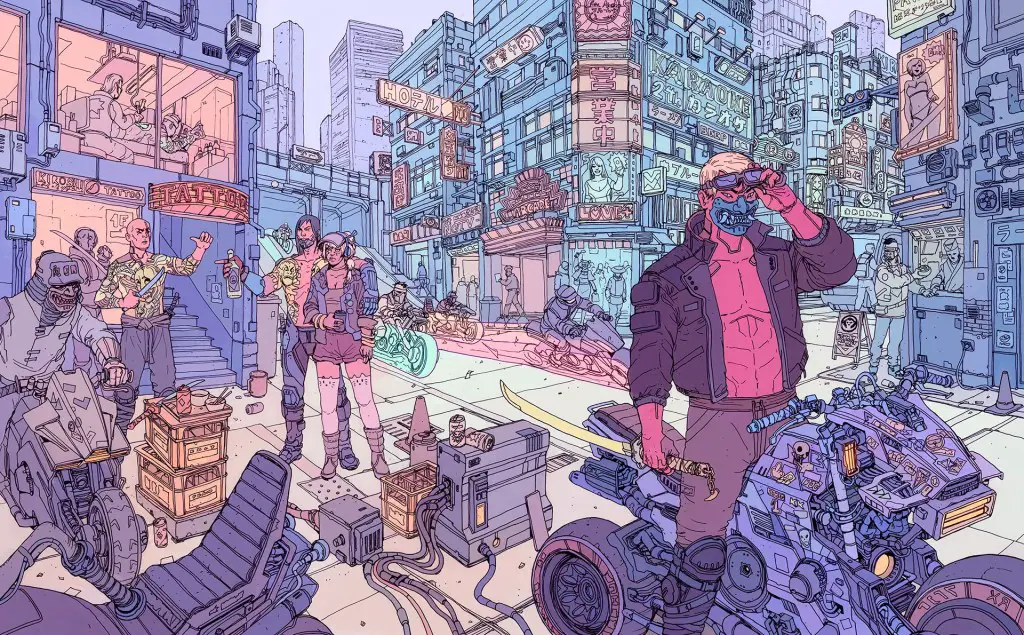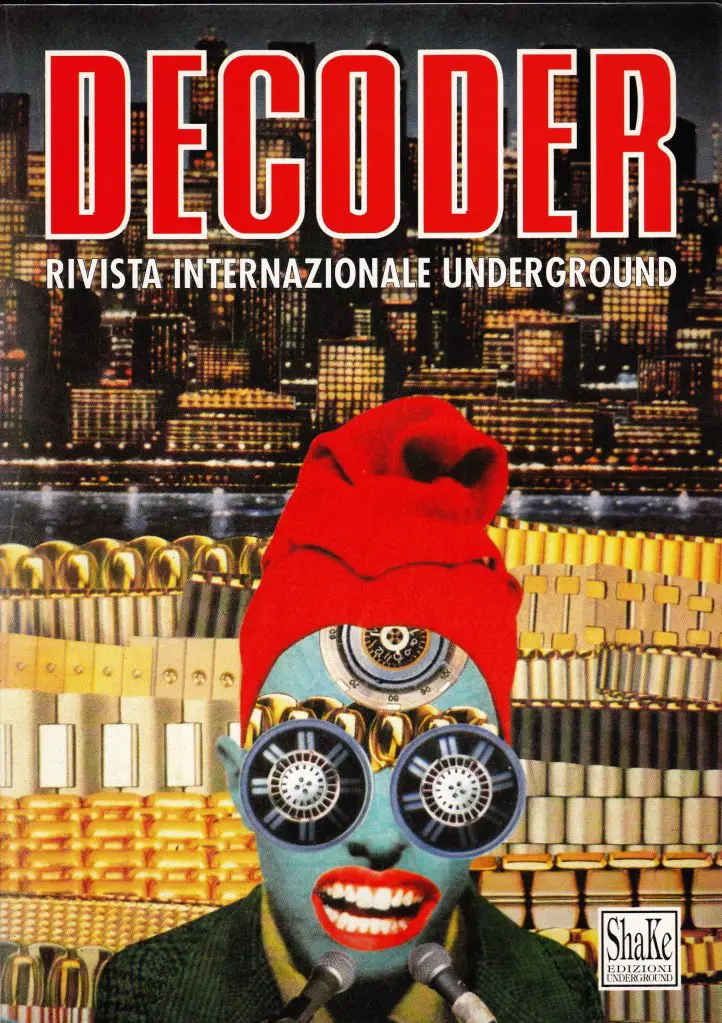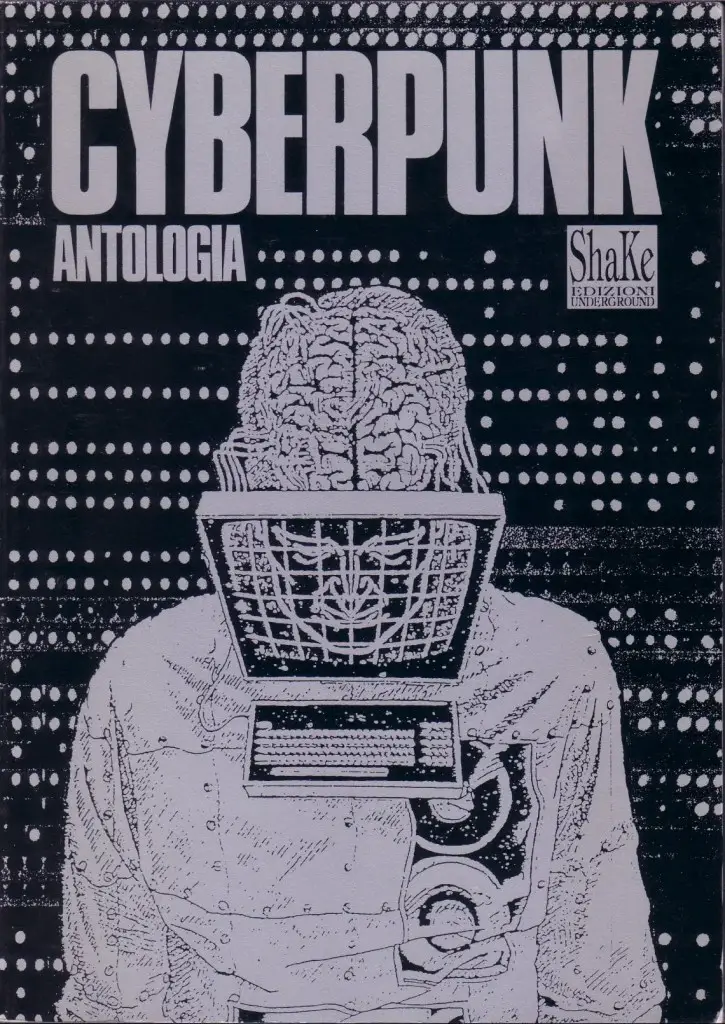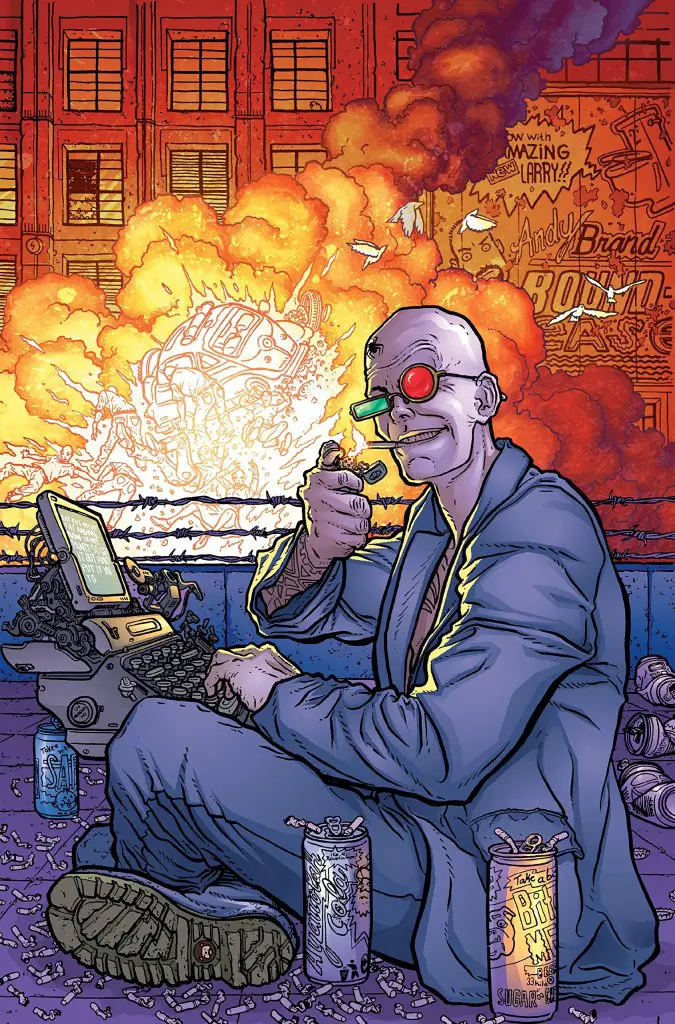When the commercial apex of a genre testifies to its spiritual death, it is necessary to trace its origins to give it new life.
di Lorenzo Pennacchi
After years of waiting in December it finally came out Cyberpunk 2077 developed by CD Projekt RED. A few weeks ago Mondadori published the collection Cyberpunk, which includes three great classics of the genre: Neuromancer di W, Snow crash di Neal stephenson e The broken matrix di Bruce Sterling. A shopping list should be made just to list the main works that can be classified in this category and its precursors. Blade Runner, Ghost in the Shell, Transmetropolitan, Nirvana… Cyberpunk is everywhere, but that's not necessarily good. It's a problem when he relates to a society that is too cyber and not very punk, which reduces him to yet another object of consumption and turns him into an agent of entertainment society, theorized by Guy Debord in 1967 [1]:
The spectacle is the bad dream of chained modern society, which ultimately expresses only its desire to sleep. The spectacle is the guardian of this sleep.

With advanced technologies, neon lights and Keanu Reeves on duty, the viewer is drawn into the cyberspace of infinite possibilities. But it remains helpless there. So cyberpunk is selling its soul to the devil, in contradiction to the principles that founded it. This paradoxical condition is perceived above all in reference to the Italian context. In the nineties in Italy cyberpunk was something markedly political. To realize this it is enough to recover some cult texts of that period. The preface to the anthology Cyberpunk edited by Shake Edizioni Underground opens with these words by the curator Raffaele Scelsi [2]:
The political tension of this paper is in fact oriented towards the re-appropriation of communication by social movements, through the formation of alternative computer networks, which can finally impact the excessive power of multinational companies in the sector..
And it ends like this [3]:
Today, through cyberpunk, the opportunity is offered to all cultural and movement operators to open a new enormous field of production of collective imagery, capable of unhinging the tenacious imaginative layer that exists, from which it has been compressed for the longest time.
There is no party, but gods are affirmed principles. Self-management, the democratization of information and the potential of new technologies are not slogans, as we read at the beginning of the volume: «There is no copyright on this publication. However, all those companies that work for the construction and maintenance of a "society oriented towards closed-type communication" are wary of making free use of it " [4]. Cyberpunk not as a playful-literary tinsel, but subculture. The genre finds diffusion through the numerous fanzines of the period (like the Shake's Decoder) and is embodied by the most disparate groups: from Mutoid Waste Company (the mutoid community born in London and now residing in Santarcangelo di Romagna) to hackers. In August 1989 the international hacker scene agreed on ten shared points, to break the monopoly of states and multinationals on communication. The basic idea is that information belongs to the whole world and should not remain at the service of one uncontrolled caste of privileged technocrats: "Computer scientists, scientific and technical, are at the service of all of us" [5].

The term cyberpunk is made up of two currents which, at first, may seem contradictory. In God save the Cyberpunk, Mafalda Stasi summarizes its genesis [6]:
In the name Cyber-Punk the two major ideological currents that "make" the movement are condensed, and while punk is the "angry father", which contributes to the anarchic and rejection attitude, anger and aggression, the new science of cybernetics is a “mother of ice".
In the preface to the anthology of short stories Mirrorshades, Sterlingri traces the origins of the trend he helped to create. Acknowledges the debt to William S. Burroughs, James H. Ballard, Philip K. Dick and numerous other sci-fi and new wave authors, as well as punk music and its ideal return to its roots. Definitely [7]:
Cyberpunk comes from that realm where the computer pirate and the rocker overlap, a cultural soup where genetic codes combined with each other merge. Some find the result bizarre, even monstrous, for others this integration is a powerful source of hope.
It is no coincidence that the protagonists of cyberpunk novels are often gods outcasts. Of Gibson's characters, Sterling states that they are a gang of pirates made up of losers, whores, lost, stragglers and madmen. The protagonist of Snow crash it's a deliverer, a pizza delivery man on behalf of CosaNostra, forced to drive around with a gun in a very powerful car: "There is only one rule: the deliverer goes with his head held high and delivers the pizza to you in thirty minutes, otherwise you can not pay , kill him, take his car and sue him " [9].

Cyberpunk writers are interested in a multitude of themes. The bodily and mental invasion by technologies, with the consequent redefinition of human nature, is probably the main one. In this sense the psychologist Timothy Leary, known above all for his positions in favor of the use of psychedelics, has advanced numerous parallels between drugs and new technologies, calling computers the LSD of the XNUMXs [10]. From guru of the psychedelic experience to video game programmer, in a long interview in 1990, Leary traces his vision of the world (individualistic, radically democratic and at times ambiguous) in the wake of the incredible amount of experiences he has lived: "I have actively experimented seven decades of accelerated change. I surfed every wave of the twentieth century with reasonable success and considerable fun " [11]. For Leary, contemporary man is surrounded by an immense amount of wealth yet to be experienced, mostly virtual, in view of a necessarily electronic future. Scientific, cultural and anthropological research must therefore be oriented in this direction, giving life to advanced sensory experiences [12]:
Virtual realities are those realities that the mind and the brain together help to create. The experienced psychedelic person has learned how to move through these realities. Now it's about doing it through a virtual reality produced by technology, rather than drugs.
In cyberpunk literature, virtual reality is called cyberspace: «A graphical representation of data obtained from the memories of each computer of the human system. Unthinkable complexity. Lines of light arranged in the non-space of the mind, clusters and constellations of data. Like the lights of a city, moving away ... " [13]. In reality, cyberspace has far more pragmatic definitions than Leary's visionary hypotheses. According to John Barlow, author of the lyrics for the Grateful Dead, "cyberspace is where you are when you are on the phone" [14]. In this sense, cyberspace would coincide with telematic network. Today, between smartphones and social networks, we would be immersed in it twenty-four hours a day. Holidays included. As a double of this virtual, but absolutely real dimension, cyberpunk writers present a chaotic society, monopolized by large multinationals (the zaibatsu) and assembled in the exterminated sprawl. According to Gibson's description in Neuromancer [15]:
Night City was like a derailed experiment in social Darwinism, conceived by a bored researcher who kept a permanent thumb on the fast-forward button. If you stop pushing your way for a moment, you sink without a trace: move a little too quickly and you will end up breaking the fragile surface tension of the black bag; in both cases you will disappear with no trace of you left, save for a vague memory in the mind of an institution like Ratz, even if the heart, lungs or kidneys may survive the service of some stranger with lots of new yen for the tanks of the clinics.

Cyberpunk writers are mostly interested in investigating these issues, not subverting them. As the philosopher Mark Downham boldly observes on a literary level, "cyberpunk is bullshit" [16]. Cyberpunk masterpieces have a ridiculous storyline and a poorly flowing style. I'm bad to read, at times irritating, but the game is worth the candle [17]:
Cyberpunk is an industrial myth of the near future, a new techno-surrealist science fiction [...] Cyberpunk is a mass of questions about great destruction, the ultimate chemical threshold. It comes right down to you like thousands of tons of heavy metal, howling and howling, something that will open your skull out of sight. Cyberpunk is not mediocre, it is not superlative, it is total, it is truly critical. Cyberpunk is potentially a disordered mass of reference fictions stolen from the near future in the search for an operational strategy to live life, my life, your life, life, which in itself is increasing the experiential slip in the virtual technologies of the near future.
For us today to read Gibson, Sterling and Stephenson means no longer running into the near future, but into recent past. Yet their works are still able to lift anthropological questions central to our lives and the development of society. But we don't seem to notice, too caught up in the plots, details and photos to hit our message boards. It is sad to note that this is the most widespread debate around Cyberpunk 2077 either the one related to the bugs in the game, or how much the comments on the anthology published by Mondadori mostly concern the beauty of the cover. In a world where subcultures disappear and the underground is sucked into the zaibatsu, the consumer is immersed in cyberspace: takes everything as a show and participates in it. In a hyperreality of this type, resisting, proposing alternatives, is difficult. As Debord notes [18]:
The spectacle is the ideology par excellence, because it exposes and manifests in its fullness the essence of every ideological system: the impoverishment, enslavement and denial of real life.
Ma resistance from below is required. It doesn't matter if the democratization of information has failed or if emancipation through technology will forever remain a utopia. What matters is to state how critical subjects of our time, and not as consumer items. "To effectively destroy the society of the spectacle, it takes men who put a practical force into action" [19]. You don't have to be a hacker to become an actor in this process: even a cultural magazine can do its part. And who knows if one day we might unhinge the tenacious imaginative hood in which we are compressed.
Note:
[1] Guy Debord, The society of the show, bcdeditore, Milan 2013, p. 59.
[2] Raffaele Scelsi, Cyanide apple, in Raffaele Scelsi, Cyberpunk. Anthology of political texts, Shake Edizioni Underground, Milan 1990, p. 9.
[3] Ibid, p. 33.
[4] Ibid.
[5] Final Declaration of ICATA 89, Terminal 1989, in cyberpunk, pp. 107-108.
[6] Mafalda Stasi, God save the Cyberpunk, Synergon Paths, Bologna 1993, p. 9.
[7] Bruce Sterling, preface a Mirrorshadesin Cyberpunk, P. 39.
[8] See: Joel Saucin, William Gibson or the future reinvented, Phenix 1989, in cyberpunk, p. 49.
[9] Neal Stephenson, snowcrash, Shake Edizioni Underground, Milan 1995, p. 7.
[10] See: Sterling, p. 40.
[11] David Sheff, The virtual realities of Timothy Leary, 1990 interview on Upside, in Cyberpunk, P. 147.
[12] Ibid, p. 163.
[13] William Gibson, Neuromancer, Oscar Mondadori, Milan 2015, p. 54.
[14] Stasis, p. 67.
[15] Gibson, p. 9.
[16] Mark Downham, Cyberpunks!, article taken from Vague n. 21 of 1988, in cyberpunk, p. 71.
[17] Ibid, p. 72.
[18] Debord, p. 180.
[19] Ibid, p. 172.

Wonderful article!
I would like to say a couple of lines on cyberpunk 2077 that after waiting for many years everyone expected great things from this game but unfortunately the game turned out to be a disaster and was almost unplayable on consoles and the game was not perfect for Even PC. That said, there have been a lot of improvements to the game since its release, but it's still far from a perfect game.